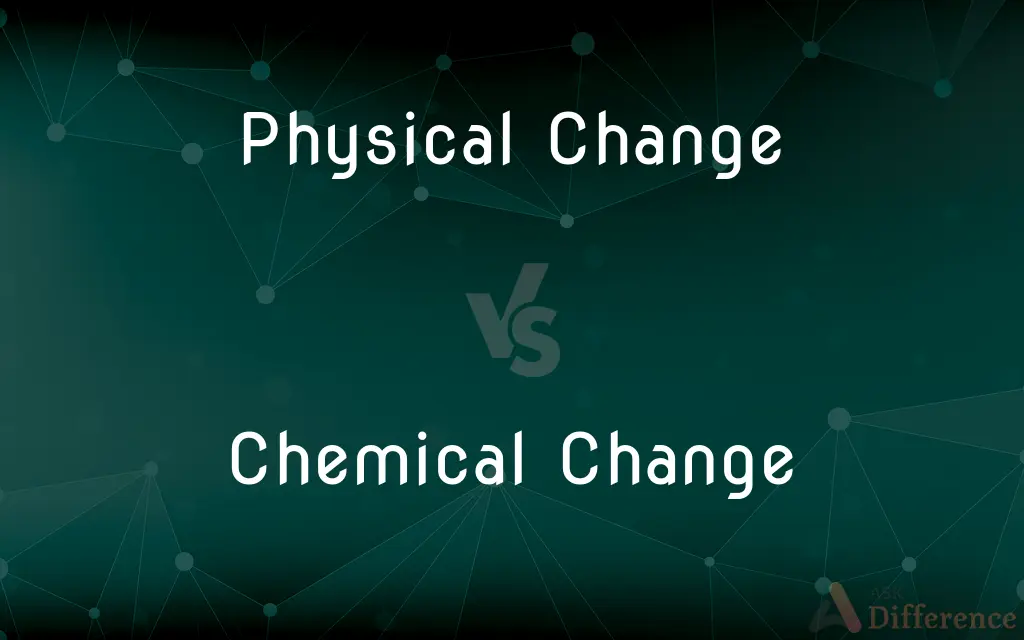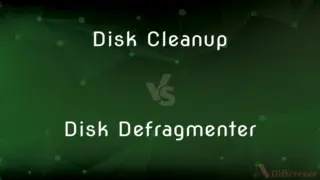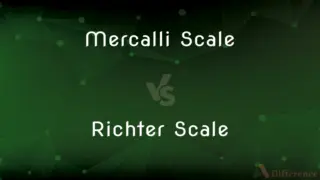Physical Change vs. Chemical Change — What's the Difference?
By Tayyaba Rehman — Published on October 21, 2023
Physical Change alters the form without changing the substance, while Chemical Change transforms the substance into a new one.

Difference Between Physical Change and Chemical Change
Table of Contents
ADVERTISEMENT
Key Differences
Physical Change pertains to a transformation in which no new substance is created. It is primarily a change in state, shape, or appearance. In contrast, Chemical Change involves the formation of entirely new substances, usually accompanied by energy release or absorption.
In a Physical Change, the molecules remain the same, merely rearranging or changing position. When ice melts, it becomes water, but its molecular composition (H2O) stays the same. Conversely, Chemical Change reshapes the molecular structure. When wood burns, it turns into ash, carbon dioxide, and water vapor - entirely different substances.
Physical Changes are often reversible. For instance, water can evaporate and condense repeatedly. Chemical Changes, however, are typically irreversible. Once a paper is burned, it can't revert to its original state.
Factors like temperature and pressure primarily influence Physical Changes. On the other hand, Chemical Changes are instigated by chemical reactions, leading to the breaking and forming of chemical bonds.
Significantly, while Physical Changes don't produce new substances, Chemical Changes do, often resulting in distinct properties compared to the reactants. This difference highlights the core distinction between the two types of changes.
ADVERTISEMENT
Comparison Chart
Nature
Change in form or state.
Formation of a new substance.
Molecular Structure
Remains the same.
Alters and forms new compounds.
Reversibility
Often reversible.
Typically irreversible.
Energy Changes
Usually no energy release.
Often involves energy release or absorption.
Examples
Melting, freezing, dissolving.
Burning, rusting, decomposing.
Compare with Definitions
Physical Change
A transformation not producing new substances.
Melting ice is a Physical Change as it remains water.
Chemical Change
A process creating new substances.
Burning paper results in a Chemical Change.
Physical Change
An alteration in state or appearance.
Tearing a paper involves a Physical Change.
Chemical Change
Reactions involving bond breakages and formations.
Digesting food is a Chemical Change in the body.
Physical Change
A change that doesn't affect molecular structure.
Dissolving sugar in water is a Physical Change.
Chemical Change
Changes typically signified by color shifts, gas production, or temperature variations.
Baking bread is a Chemical Change, turning dough into bread.
Physical Change
Modifications without new chemical compositions.
Boiling water exemplifies a Physical Change.
Chemical Change
A transformation involving molecular reconfigurations.
Rusting iron undergoes a Chemical Change.
Physical Change
Variations often influenced by temperature or pressure.
Compressing a gas results in a Physical Change.
Chemical Change
Alterations often releasing or absorbing energy.
Photosynthesis in plants is a Chemical Change.
Common Curiosities
Do Physical Changes involve energy releases or absorptions?
Physical Changes usually don't involve significant energy changes, while Chemical Changes often do.
How do Physical Change and Chemical Change differ in nature?
Physical Change alters form or state without creating new substances, while Chemical Change results in new substances.
Is the dissolution of salt in water a Chemical Change?
No, it's a Physical Change; the salt can be recovered by evaporating the water.
Can Chemical Changes be signaled by color changes?
Yes, color shifts can indicate Chemical Changes, among other signs like gas production.
Are Chemical Changes always evident?
Not always. Some Chemical Changes might not show immediate evident signs but can be detected through tests.
How does breaking a glass differ from burning paper in terms of change?
Breaking glass is a Physical Change, while burning paper is a Chemical Change.
Do Chemical Changes result in new properties?
Yes, products of Chemical Changes often have properties distinct from the reactants.
Are all Chemical Changes accompanied by energy changes?
Most Chemical Changes involve energy changes, either absorbing or releasing energy, but not all are noticeable.
Does Chemical Change alter the molecular structure?
Yes, Chemical Change reshapes the molecular structure, producing new compounds.
What's an example of a Physical Change?
Melting ice into water is a Physical Change.
Can Physical Changes be reversed?
Often, Physical Changes are reversible, like freezing and melting, whereas Chemical Changes are typically permanent.
Why is digesting food a Chemical Change?
Digestion breaks down food into simpler compounds, altering its molecular structure, signifying a Chemical Change.
How is burning wood categorized?
Burning wood is a Chemical Change as it produces ash, carbon dioxide, and water vapor.
Can Physical Changes be brought about by external conditions?
Yes, factors like temperature and pressure can induce Physical Changes, like boiling or condensation.
Can changes in state, like from solid to liquid, be Physical Changes?
Yes, changes in state, such as melting or freezing, are examples of Physical Changes.
Share Your Discovery

Previous Comparison
Disk Cleanup vs. Disk Defragmenter
Next Comparison
Mercalli Scale vs. Richter ScaleAuthor Spotlight
Written by
Tayyaba RehmanTayyaba Rehman is a distinguished writer, currently serving as a primary contributor to askdifference.com. As a researcher in semantics and etymology, Tayyaba's passion for the complexity of languages and their distinctions has found a perfect home on the platform. Tayyaba delves into the intricacies of language, distinguishing between commonly confused words and phrases, thereby providing clarity for readers worldwide.














































